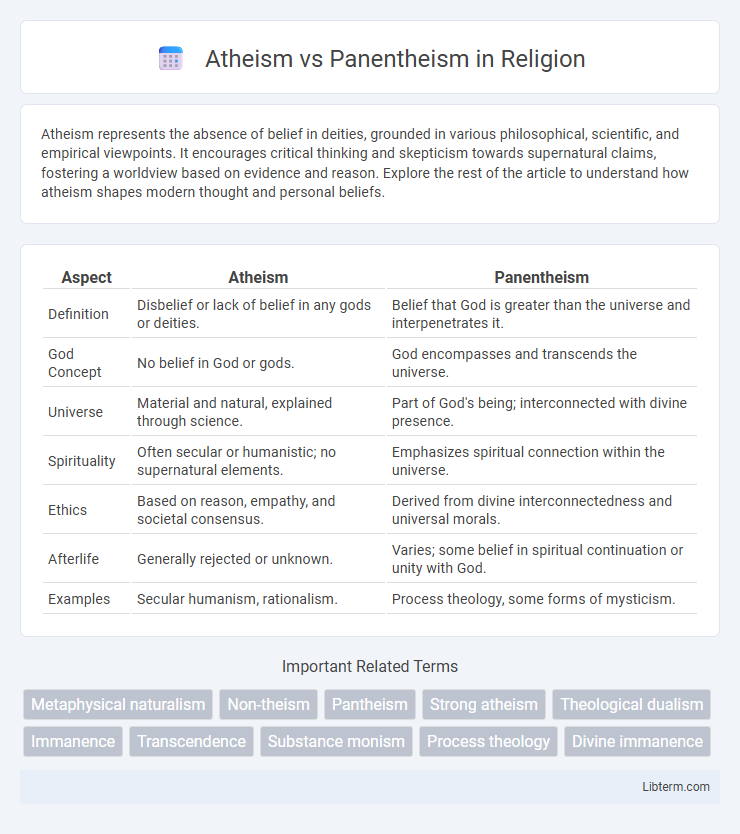Atheism represents the absence of belief in deities, grounded in various philosophical, scientific, and empirical viewpoints. It encourages critical thinking and skepticism towards supernatural claims, fostering a worldview based on evidence and reason. Explore the rest of the article to understand how atheism shapes modern thought and personal beliefs.
Table of Comparison
| Aspect | Atheism | Panentheism |
|---|---|---|
| Definition | Disbelief or lack of belief in any gods or deities. | Belief that God is greater than the universe and interpenetrates it. |
| God Concept | No belief in God or gods. | God encompasses and transcends the universe. |
| Universe | Material and natural, explained through science. | Part of God's being; interconnected with divine presence. |
| Spirituality | Often secular or humanistic; no supernatural elements. | Emphasizes spiritual connection within the universe. |
| Ethics | Based on reason, empathy, and societal consensus. | Derived from divine interconnectedness and universal morals. |
| Afterlife | Generally rejected or unknown. | Varies; some belief in spiritual continuation or unity with God. |
| Examples | Secular humanism, rationalism. | Process theology, some forms of mysticism. |
Defining Atheism: Core Principles and Beliefs
Atheism is defined by the absence of belief in deities, grounded in a reliance on empirical evidence and scientific reasoning to understand the universe. Core principles of atheism emphasize skepticism toward supernatural claims and prioritize naturalistic explanations for existence and consciousness. This worldview often encourages ethical frameworks based on human experience and rationality rather than divine authority or spiritual doctrines.
Understanding Panentheism: Central Tenets and Variations
Panentheism asserts that the divine interpenetrates every part of the universe while extending beyond it, emphasizing a dynamic relationship between God and creation. Central tenets include the belief in a God who is both immanent within the cosmos and transcendent beyond it, differing from atheism's rejection of divine existence. Variations of panentheism range from views that see God as evolving with the universe to interpretations that portray the divine as a unifying consciousness encompassing all reality.
Historical Roots: Origins of Atheism and Panentheism
Atheism traces its historical roots to ancient Greek philosophy, with figures like Democritus and Epicurus promoting naturalistic explanations devoid of deities, emphasizing empirical reason and skepticism during the Enlightenment period. Panentheism, rooted in Hinduism's Upanishads and later developed by thinkers such as Baruch Spinoza, views divinity as both immanent in the universe and transcendent beyond it, blending spirituality with philosophical monism since antiquity. These origins highlight atheism's rejection of supernaturalism contrasted with panentheism's synthesis of the divine with the cosmos, reflecting divergent approaches to existence and transcendence.
Key Philosophical Differences Between Atheism and Panentheism
Atheism fundamentally denies the existence of any deity or divine presence, emphasizing a materialistic understanding of the universe based solely on empirical evidence. Panentheism, however, posits that the divine interpenetrates and extends beyond the universe, integrating both immanence and transcendence in its worldview. This distinction highlights atheism's rejection of supernaturalism versus panentheism's belief in a unified, evolving cosmos with an inherent divine essence.
Views on the Divine: Absence vs. Immanence and Transcendence
Atheism asserts the absence of any divine presence, rejecting beliefs in gods or supernatural beings, while panentheism embraces a divine that is both immanent within the universe and transcends it simultaneously. In panentheism, the divine permeates all aspects of existence yet also exists beyond physical reality, integrating both transcendence and immanence into a unified concept. Atheism fundamentally denies any form of divine essence, contrasting sharply with panentheism's affirmation of a pervasive and encompassing divinity.
The Role of Science and Reason in Atheist and Panentheistic Thought
Atheism prioritizes empirical evidence and scientific inquiry as the sole means of understanding reality, often rejecting supernatural explanations due to lack of observable proof. Panentheism integrates scientific reasoning with a belief in a divine presence that permeates and transcends the universe, viewing science as a tool to explore the manifestations of this immanent deity. Both frameworks value reason, but atheism relies exclusively on materialist interpretations, whereas panentheism combines reason with metaphysical notions of divinity embedded in the cosmos.
Ethical Frameworks: Morality Without and Within the Divine
Atheism grounds its ethical framework in secular humanism, emphasizing reason, empathy, and societal well-being without reliance on divine command or supernatural authority. Panentheism integrates morality within the divine, viewing ethical principles as expressions of a living, immanent God present in all aspects of the universe. Both perspectives promote moral responsibility, but atheism derives ethics from human experience and rationality, while panentheism finds moral guidance through a dynamic relationship with the divine in nature.
Influence on Modern Society and Culture
Atheism profoundly influences modern society by promoting secularism, scientific inquiry, and critical thinking, shaping contemporary ethical frameworks and public policies devoid of supernatural beliefs. Panentheism impacts modern culture by offering a spiritual perspective that integrates divinity with the universe, influencing environmental ethics, holistic wellness movements, and interfaith dialogues. Both worldviews contribute to ongoing debates about the role of spirituality, morality, and meaning in a rapidly evolving global society.
Critiques and Common Misconceptions
Atheism is often critiqued for allegedly promoting moral relativism or nihilism, which many proponents contest by highlighting secular ethical frameworks. Panentheism faces misconceptions related to its belief in a God both immanent and transcendent, leading critics to mistakenly equate it with pantheism or traditional theism. Both worldviews challenge prevailing religious doctrines, resulting in debates over the nature of divinity, existence, and the universe's interconnectedness.
Contemporary Dialogues: Bridging the Differences
Contemporary dialogues between atheism and panentheism emphasize the shared quest for understanding existence without relying solely on traditional theistic frameworks. These discussions highlight panentheism's view of the divine as interwoven with the universe and atheism's emphasis on empirical evidence and naturalism. Bridging the differences involves exploring common ground in ethical values, the nature of consciousness, and the origins of the cosmos.
Atheism Infographic

 libterm.com
libterm.com